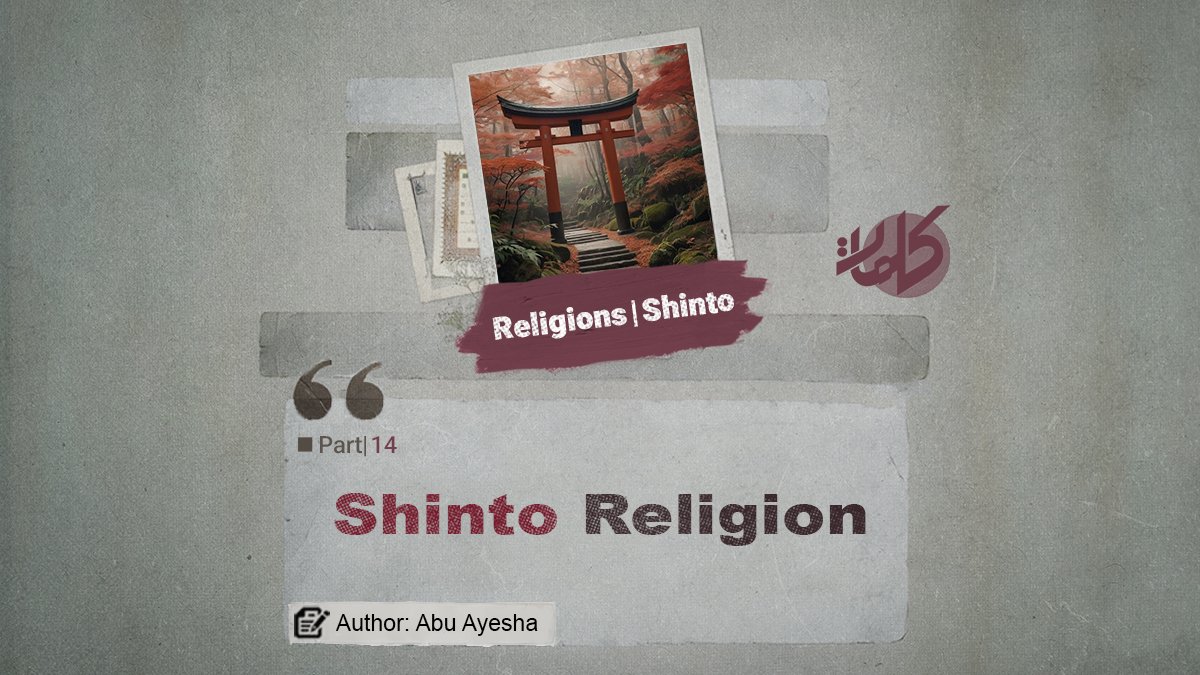Author: Abu Ayesha
Shinto Religion (Part 14)
Introduction:
In the previous section, we discussed the most significant rituals of the Shinto faith and the elements of worship within it—such as purification, prayer, household shrines, and others. The common ceremonies in the Shinto religion, like those in other faiths lacking a comprehensive and all-encompassing law, are numerous. As we continue our study of Shinto rituals, we now reach one of the most famous of these practices known as the Bushidō ceremony. Although Bushidō does not originally belong to the Shinto faith itself, over time it became closely associated with it and is now considered a part of it. Therefore, we shall also address it here.
One of the well-known traditions related to the Shinto religion is the ethical code of Bushidō, meaning “The Way of the Warriors.” This code dates back to the medieval period, when it was adopted as a military code of conduct and gradually spread to the extent that it deeply influenced the Shinto religion. The Bushidō code, which originally served only as a model for the behavior and conduct of warriors, was later summarized under eight key principles.[1]
Commentators on Bushidō have elaborated extensively on the moral values promoted by this code—values such as loyalty, courage, self-sacrifice, proper conduct, benevolence, honor, justice, and self-control. However, except for the moral philosophers of China—Confucius and Mencius—they have not discussed any specific prohibitions corresponding to those virtues.
Bushidō is not a formal or written code. At most, it consists of a set of general moral rules transmitted orally or inspired by the reflections of a warrior or a scholar. The strength—or weakness—of Bushidō lies in the fact that it lacks any fixed written creed. It appears that the ethical system of Bushidō grew alongside Japan’s military feudalism and later declined with it.[2]
Shinto and the Way of the Warriors
The Shinto faith has long been intertwined with the way of the warriors, though each system retains its own distinct rules and principles. The customs and traditions of the Japanese military, dating back to the Middle Ages, are known in their language as Bushidō—“The Way of the Warriors.” This is quite similar to the chivalric traditions (Chevaliers) of medieval Europe. Both systems had a profound moral influence on their societies and, at times, cast their spell over the entire population. [3]
Preachers and advocates of the Bushidō moral code summarized its principles as follows:
1. Loyalty: Warriors must remain faithful to their superiors and, ultimately, to the emperor.
2. Gratitude: Warriors must be grateful to their homeland and to the Emperor.
3. Courage: A warrior must never hesitate to sacrifice himself in the service of the Emperor.
4. Justice: A warrior must never deviate from the boundaries of justice.
5. Honesty: A warrior must never lie out of fear.
6. Self-respect: A warrior must be strong-minded, polite, and dignified.
7. Perseverance: A warrior must be patient and enduring.
8. Freedom and Nobility: A warrior must prefer an honorable death to a life of disgrace.
9. Love for Knowledge and Learning.
10. Humanity: A warrior must always be benevolent toward society.[4]
Note: To be fair, when viewed impartially, these are indeed noble traits for any brave and honorable person. If practiced sincerely, they can cultivate the finest moral habits and virtues in individuals.
One of the key concepts emphasized in this tradition is honor. On this subject, it is said: “For a brave man, death is preferable to disgrace. A warrior must always carry two swords—one long, to fight his enemies, and one short, to end his own life in case of fault or defeat.” [5]
The Japanese readiness and inclination toward suicide is considered one of the greatest and most significant expressions of Bushidō ethics, for every brave warrior is expected to redeem any loss or failure immediately at the cost of his life. He must always be ready, heart and soul, for such a sacrifice. This act of suicide must be carried out according to a ritual method known as Hara-kiri—wherein a brave man, with full composure and adherence to established rules, takes his own life without showing emotion. [6]
As previously mentioned, the Shinto faith has neither a prophet nor any revealed scriptures, since it is not a divinely ordained religion but rather a human-made belief system filled with myths, superstitions, and legends. At times, these myths and fables reach such extremes that reason fails to comprehend them, leaving one to wonder how such beliefs ever originated. To preserve the tales and stories of their ancestors, the leaders of Shinto ordered them to be recorded in writing. Thus, the books that later emerged in this faith were merely collections of stories about their past emperors.
“Shinto has no sacred text; however, there exist collections of ancient writings that contain old Japanese myths and legends, which are respected and considered authoritative.” [7]
continues…
Previous Part/ Next Part
References:
[1] Mobalaghi Ābādānī, Abdullah. Tārīkh-e Adyān wa Mazāheb-e Jahān, vol. 1, n.d., p. 111.
[2] Tahoora Encyclopedia, article: Ethics of the Shinto Religion.
[3] John Noss, A History of the World’s Religions, trans. Ali Asghar Hikmat, 3rd ed., Franklin Publishing, 1975, p. 290.
[4] Mobalaghi Ābādānī, Abdullah. Tārīkh-e Adyān wa Mazāheb-e Jahān, vol. 1, n.d., p. 113.
[5] John Noss, A History of the World’s Religions, trans. Ali Asghar Hikmat, 3rd ed., Franklin Publishing, 1975, p. 290.
[6] Ibid., pp. 290–291.
[7] Ebrahim, Alireza. Shinto Religion; A View from Above, n.d., p. 97.



